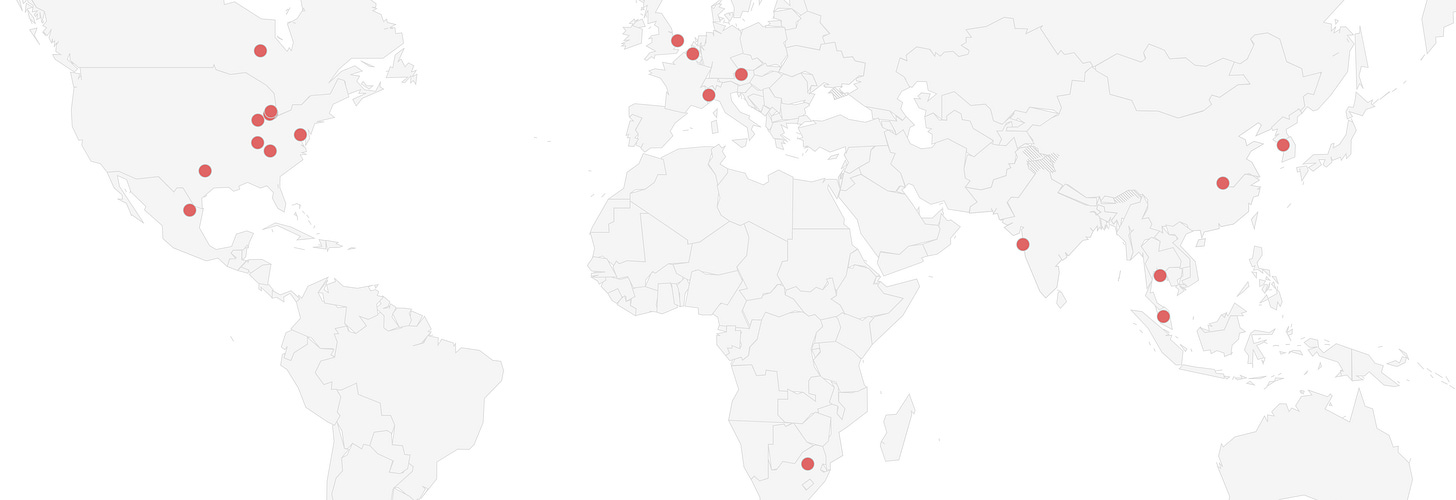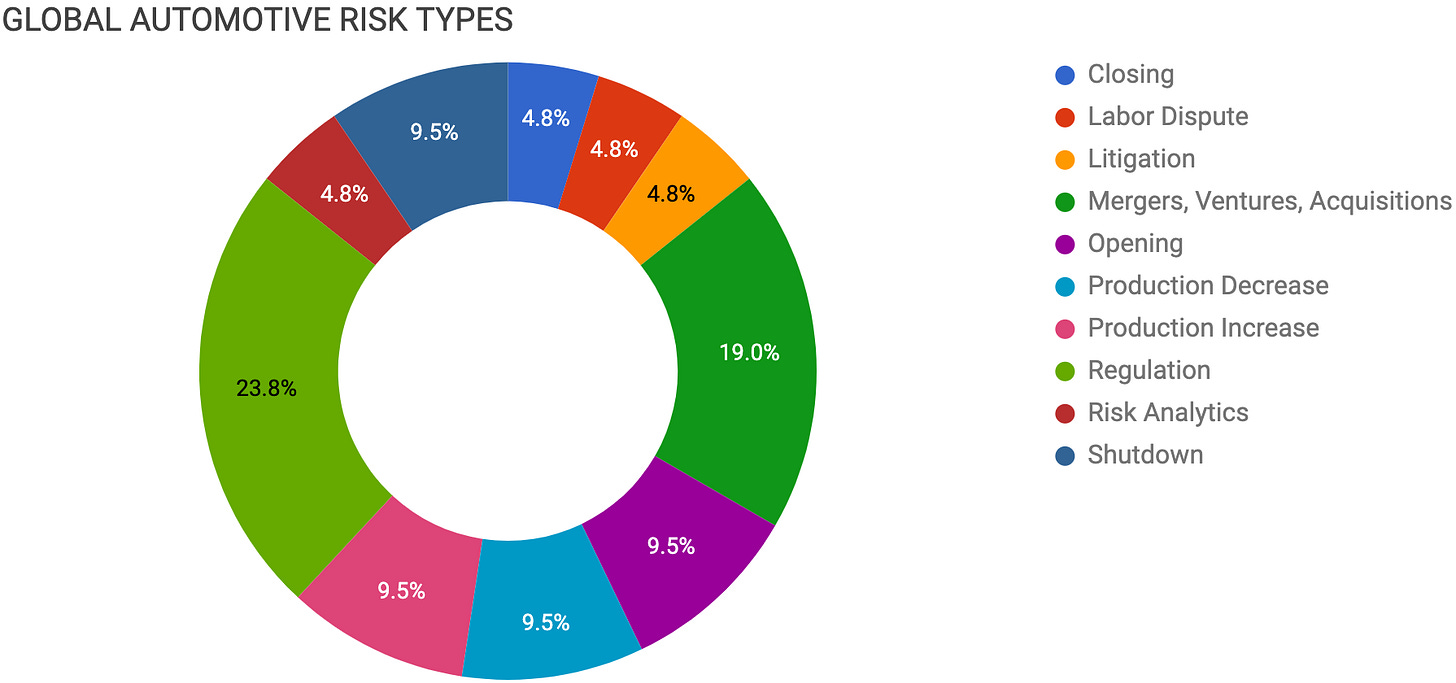Automotive Supply Chain Risk Digest #445
August 22 - 28, 2025, by Elm Analytics
Contents
CLOSING
Detroit stamping plant closing
LABOR DISPUTE
UAW narrowly wins Ford battery union
LITIGATION
Lucerne sues Tilton over asset transfers
MERGERS, VENTURES, ACQUISITIONS
Nemak buys GF Casting for $336M
Dongfeng goes private, spins off Voyah
Hyundai, Kia partner with Korean battery firms
Mercedes may source BMW engines
OPENING
Slate to retool for Indiana EV plant
BYD opening Malaysian CKD assembly plant
PRODUCTION DECREASE
Ford South Africa cuts 470 jobs
Stellantis extends reduced Turin hours
PRODUCTION INCREASE
BYD exports Thai-made EVs to Europe
MAHLE starts EV e-compressor production
REGULATION
US tariffs raise auto retooling costs
US-EU may align auto regulations
Tariffs push reshoring, more US plants
US suppliers may expand tariff coverage
India tire industry seeks tax relief
RISK ANALYTICS
Legal strategies for supply chain secrets
SHUTDOWN
Lotus cutting 550 jobs after halt
GM pauses Factory Zero shifts, 360 jobs
Closing
Autokiniton will permanently close its Oakland Stamping complex, located near the Detroit–Highland Park border in Michigan, by December 31, resulting in the loss of over 100 jobs.
The Tier 1 supplier, which provides body stampings and welded assemblies to Ford, GM, and Stellantis, stated that the decision followed a portfolio review. However, it comes just months after workers ratified a new union contract.
The closure spotlights mounting strain in the highly tariffed metals supply chain, with shrinking demand and cost pressures forcing suppliers to cut capacity and jobs even at long-established sites.
Labor
The UAW won a narrow vote to unionize Ford's BlueOval SK battery plant in Kentucky, but 41 challenged ballots could still alter the result. A union foothold at this EV battery site would be a significant shift for labor in the South and could influence Ford's EV supply chain.
Litigation
Lucerne International has filed a $39M lawsuit in Detroit against financier Lynn Tilton and her affiliates, accusing them of fraudulent asset transfers to avoid paying a prior $32M judgment.
The dispute stems from a 2018 supply chain conflict in which Tilton-owned firms allegedly cut Lucerne out by dealing directly with its Tier 3 suppliers, nearly pushing the Michigan-based Tier 2 supplier to the brink of insolvency.
Mergers, Ventures, Acquisitions
Nemak, based in Nuevo León, Mexico, will acquire Swiss GF Casting Solutions' automotive business for $336M, pending regulatory approval.
The deal encompasses nine plants located in Austria, China, Romania, Germany, and the US, as well as an R&D center in Switzerland, employing approximately 2.5k people.
GF Casting Solutions makes lightweight aluminum and magnesium components, 80% of which serve EV, structure, and chassis applications, with customers ranging from Audi, BMW, and Mercedes to BYD, Nio, and Geely.
Dongfeng Motor Group, currently a publicly traded company with majority state ownership, plans to go private by acquiring the shares of minority shareholders.
At the same time, it is spinning off its electric vehicle unit, Voyah, as a separate publicly traded company through a listing on the Hong Kong Stock Exchange.
This restructuring enables Dongfeng to privatize its traditional automotive business while allowing Voyah to operate independently as a high-growth EV brand with its own public listing.
Hyundai and Kia have partnered with LG Energy Solution, Samsung SDI, and SK On to enhance EV battery safety and technology, focusing on patents, quality, and fire safety technology. The venture aims to counter China's lead in batteries and strengthen Korea's EV supply chain competitiveness.
Mercedes is reportedly in talks to source BMW's B48 four-cylinder engine for future hybrids, securing Euro 7 compliance (crucial for continuing to sell ICE models) and cutting development costs. If agreed, it would be the first time Germany's luxury rivals share core powertrain tech, with possible shared US production to avoid tariffs.
Opening
EV startup Slate will retool a former printing plant in Warsaw, Indiana, to manufacture its affordable, modular EV pickup and SUV kits. The facility is expected to hire a workforce of 2k and aims for Q4 2026 production.
BYD will open a 600k m² completely knocked down (CKD) assembly plant in Malaysia by H2-2026. The facility will be BYD's third in Southeast Asia, following its recent expansions in Thailand and Indonesia.
While sales in China have weakened, BYD's global deliveries remained relatively flat at 344k year-over-year. Overseas sales are making up an increasingly growing part of that, surging 160% to 80k.
Production Decrease
Ford South Africa will cut over 470 jobs at its Pretoria and Gqeberha plants, a move that signals broader risks for the country's auto supply chain amid weak demand and rising import pressures.
Stellantis extended reduced hours from September through January at its Turin Mirafiori plant in Italy. The delay highlights weak demand and raises doubts about the site’s long-term role without new model allocations.
Production Increase
BYD has begun exporting Thai-made 959 Dolphin EVs to Europe, helping to meet Thailand's EV 3.0 local production quota and circumventing EU tariffs on EVs manufactured in China. The plant still runs below capacity, making exports crucial to efficiency and compliance.
MAHLE has begun building e-compressors for EV HVAC systems in Tennessee, transforming its Morristown plant from ICE piston production to electrification.
Regulation
The US auto industry faces higher costs as new 50% steel and aluminum tariffs now apply to imported robotics, tooling, and machinery essential for factory retooling.
With 85% of such equipment sourced abroad, automakers and suppliers are faced with stacked tariffs, including country-level duties and metal tariffs, on $9B of annual imports, including $709M in industrial robots.
"Companies are being asked to add capacity to the United States, but with rising inflation and tariffs on key equipment they can't do without, it raises the cost to be able to do that"
- Michael Robinet of S&P Global Mobility.
The heavy reliance on foreign tool and die shops, especially in China, complicates reshoring efforts. These tariffs raise the cost of domestic auto investments and create uncertainty about the future of trade policy for suppliers.
Buried in the new US-EU trade framework is a proposal for the mutual recognition of auto safety and emissions standards, allowing cars to be sold across both markets without modification. If enacted, the deal could reshape transatlantic auto trade, lowering costs for OEMs but sparking major regulatory, safety, and environmental disputes.
Tariffs of up to 25% are driving automakers to consider new US plants and onshoring parts, with Canadian suppliers Martinrea and Linamar reporting an increase in RFQs. While USMCA rules keep parts tariff-free, uncertainty around Canada-US trade talks could shift work south.
The US will allow auto parts suppliers to request that additional items be covered under 25% tariffs, giving them a tool to target foreign competition. Automakers warn that the policy, already costing Ford, GM, and Toyota billions, remains confusing and risks a deeper strain on the supply chain.
India's Automotive Tyre Manufacturers' Association (ATMA) is seeking tax relief and duty-free imports of raw materials to remain competitive in the market. They note that higher US tariffs (50%) risk weakening India's tire export position just as manufacturers recently expanded capacity, making policy relief critical to protect supply chain viability and competitiveness.
Risk Analytics
Shutdown
Lotus will cut 550 UK jobs after halting production in May at its Hethel, Norfolk plant, citing weak sales and US tariffs on British cars. Production is expected to resume in September, but restructuring and diversification are seen as vital for the company's survival.
GM will pause two shifts at Factory Zero in Detroit-Hamtramck from September 2 to October 6 to match EV demand, affecting 360 workers and suppliers tied to Hummer EV and Escalade IQ builds.















